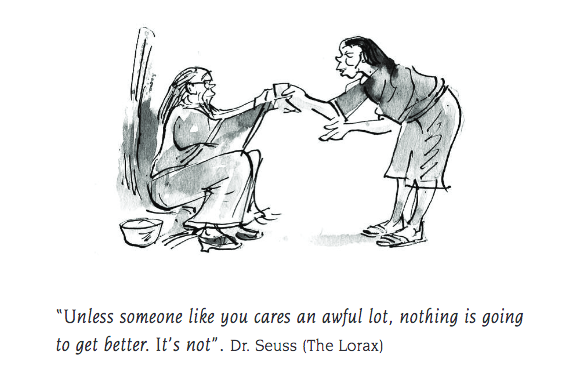Context
Business has begun to awaken to the need to heal, sustain and nurture the environment, society and the economy; to adopt people, planet and profit parameters. There is a growing realization that successful organisations will require:
- A clear (higher) purpose, supported by meaningful values that can be translated into character virtues. This will impact their reputation, performance, and ability to engage employees.1
- A devotion to the human dynamics of sustainability so that caring, loving behaviors are enabled, and there is a move from inside-out to the wider society that makes a lasting difference.2 Both of these requirements rest heavily on the characteristic of compassion. Compassion is a tenet of all the major religions including Hinduism, Judaism, Islam, and Christianity. In Buddhism, as a bird needs two wings to work in harmony so that it can fly well, we need wisdom and compassion to work in harmony in order to reach ‘enlightenment’.
Explaining compassion
In 1944 the mother of the poet Yevtushenko travelled from Siberia to Moscow, where she witnessed a procession of 20,000 German prisoners of war marching through the streets. The generals strutted at their head, oozing contempt, determined to show that they still considered themselves superior. ‘The bastards smell of perfume’, someone shouted. The crowd yelled its hatred. The women waved their clenched fists in anger, and the police had great difficulty in holding them back. But when the Russians saw how pitifully thin and ragged the ordinary German soldiers were, dirty, battered and completely miserable, many of them hobbling on crutches, the street became silent. Suddenly, an elderly woman broke through the cordon and held out a crust of bread to one of the soldiers. Then from every side, other woman copied her, giving food, cigarettes, whatever they had with them. ‘The soldiers were no longer enemies. They were people”’.3
Compassion is not an intellectual decision. We begin to practice compassion after we’ve experienced it or seen it practiced by others. It is not about having the answer, but being the answer. It is about feeling AND acting. Keltner’s extensive research exposes our limiting beliefs about power. He shows clearly how compassion and selflessness enable influence – both direct and indirect, and invoke followership.4 Compassion produces positive power.
How is the self (and the organisation) impacted?
Being compassionate benefits relationships, our health and fosters a sense of well-being. When we’re compassionate, we are less lonely. We feel better about ourselves, are happier, more content and more positive. Our resilience to stress is raised. The nurturing and caregiving areas of our brains are reinforced, our general attitude towards all other people improves, and our moral principles are upheld. In workplaces where compassion is present morale is higher and people are more committed to their jobs. Keltner has pointed out that we actually suffer moral injury, reduced happiness and lowered resilience if we are NOT compassionate. Famous brain surgeon Henry Marsh exclaimed: “What are we if we don’t try to help others? We’re nothing. Nothing at all”.5
Paul Gilbert, clinical psychologist and founder of Compassion Focused Therapy (CFT) teaches that as we humans have evolved our capacities for reflection, self-monitoring and criticism, shame, anticipation and imagination – we have developed new brain troubles in parallel (for example anxieties and fears), and the practice of mindfulness and compassion (to self and others) alleviates these new ailments.6
(Of course, depending on how much, how often and how intensely we give of ourselves, and on how we cope with this giving, we may become drained from time to time. We may need to draw on resources that refresh us: a support group, retreating to ‘sharpen the axe’, and mindfully appreciating the value of the compassionate work we’re doing – so that we are able to experience uplifting, refreshing compassion-satisfaction …..)
Developing compassion, using mindfulness
Many organisations have turned to mindfulness training to reduce stress, improve focus and increase productivity. Far fewer have employed mindfulness to build ethical, purpose-driven and com-passionate practices and character virtues. This is a huge missed opportunity.
One area of mindfulness meditation, the development of self-compassion (being aware of one’s own emotional pain, acknowledging and not blocking it, nor being over-critical of self, but rather showing kindness to self) is to foster compassion from the inside-out.
“ … contemplation is the only ultimate answer to the unreal and insane world that our financial systems and our advertising culture and our chaotic and unexamined emotions encourage us to inhabit. To learn contemplative practice is to learn what we need so as to live truthfully and honestly and lovingly. It is a deeply revolutionary matter”.7
1Williams, Graham; Haarhoff, Dorian & Fox, Peter: “The Virtuosa Organisation: the importance of virtues for a successful business”. Knowledge Resources, 2015
2Williams, Graham with Rosenstein, David: “From the Inside Out: the human dynamics of sustainability”. Sponsored by Procter & Gamble, 2016. www.haloandnoose.com/content.asp?PageID=1363.
3Zeldin, Theodore: “An Intimate History of Humanity” Vintage, 1998.
4Keltner, Dacher Dr.: “The Power Paradox: how we gain and lose influence”. Penguin Press, 2016
5Marsh, Henry: “Do No Harm: stories of life, death & brain surgery”. Thomas Dunne Books, 2014
6Gilbert, Paul: “The Compassionate Mind (Compassion Focused Therapy)”. Constable and Robinson Ltd., UK 2010.
7Williams, Rowan: Address to the Roman Synod of Bishops in 2012 cited by Richard Rohr in Action & Contemplation: The Contemplative Mind Is a Mind Liberated from Itself Daily Meditation 17th May, 2016
This chapter is extract from the book “Ancient Wisdom for Modern Workplaces” by Graham Williams and is re-published here with the kind and generous permission of the author.
Illustration courtesy: Tony Grogan

